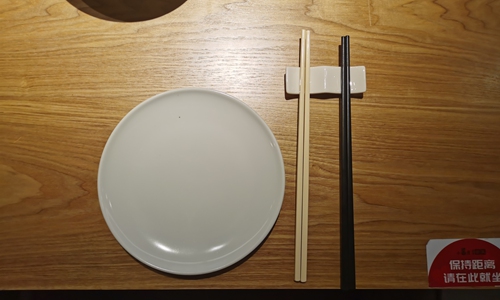More than half of 1.4 billion Chinese infected with H pylori; separate dining encouraged even at home

Two pairs of chopsticks in different colors are provided to customers in a Beijing restaurant, with one pair used as serving chopsticks. Photo: Li Lei/GT
According to statistics, more than half of Chinese, about 700 million, have been infected with the helicobacter pylori (H pylori), which is mainly transmitted through the mouth and many patients have developed a drug resistance, media reports said on Wednesday.
H. pylori is a type of bacteria which can enter human bodies and live in the digestive tract. After years, they can cause ulcers, in the lining of the stomach or the upper part of the small intestine. For some people, an infection can lead to stomach cancer.
H. pylori infections are common and there are medicines that can kill the germs and help sores heal.
With good health habits including using clean water, people can protect themselves from H. pylori.
The bacteria is easily spread among family members as families usually have meals together, causing medical experts to call on the public to separate dishes even with their family or use serving chopsticks even when eating at home.
The proposal came after a man, 30, in Nanjing, East China’s Jiangsu Province, who was diagnosed to have been infected with the H pylori, discovered his wife and parents were also infected with the bacteria, the People’s Daily reported.
Local media reported on Wednesday that Zhongda Hospital Southeast Hospital recently received the patient who claimed to be suffering from a stomachache and tested positive for the H pylori. Following his doctor’s suggestion, the man’s wife and parents were also diagnosed to have been infected with the bacteria.
His doctor speculated that the infections must have caused by dining together.
Sometimes the H pylori cannot be eradicated after treatment and patients will develop a drug resistance, said the doctor, noting that 15 to 20 percent of patients are drug resistant .
A Beijing-based gastroenterologist surnamed Zhang told the Global Time on Wednesday that if the patient is cured but his family members who tested positive for the H pylori have not been cured, he is still likely to get reinfection.
The doctors are calling for targeted treatment for those who are resistant to medicines.
Recently, more than 20 hospitals have established the precision treatment alliance against the H pylori. They planned to collected tens of thousands of H pylori specimens for drug sensitivity experiments, and patients' medication will be adjusted according to the research results.
Zhang reminded patients infected with the bacteria to sterilize their chopsticks and bowls in high temperature and change cups and toothbrush. Other family members should use different bowls, chopsticks and towels.
Since the COVID-19 outbreak, many people used serving chopsticks when eating out. The doctors called on the public to apply the serving-chopstick custom when eating with families at home to reduce the possible cross infection of H pylori.
The average infection rate of the H pylori in the global natural population is more than 50 percent, and that in China is 59 percent. The infection rate among Chinese children is 40 percent, media reports showed.

